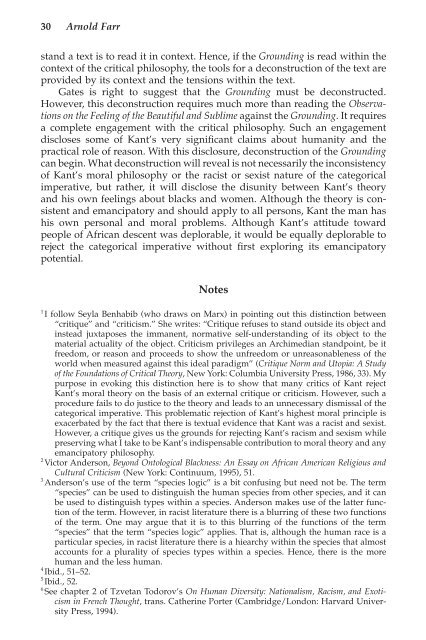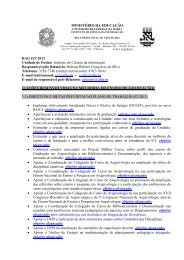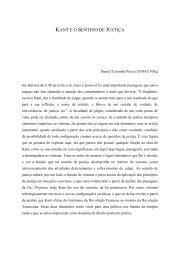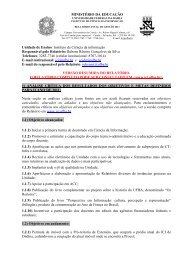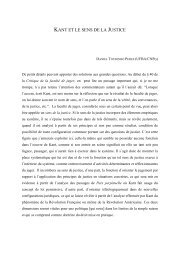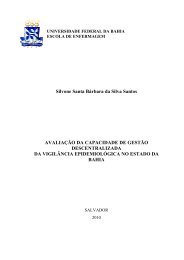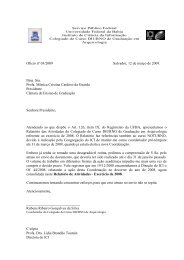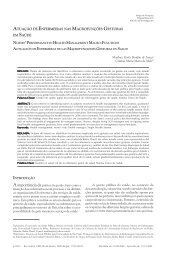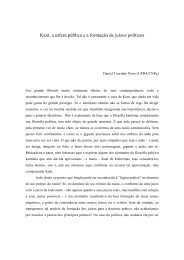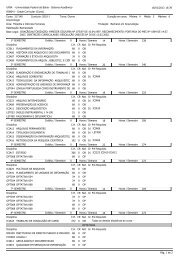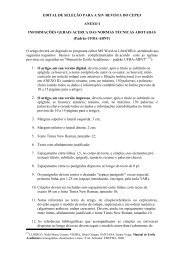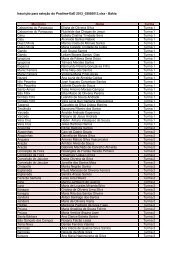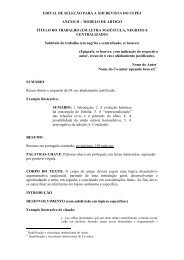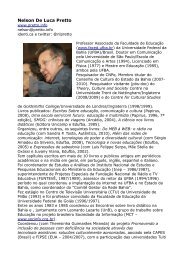Can a Philosophy of Race Afford to Abandon the Kantian ...
Can a Philosophy of Race Afford to Abandon the Kantian ...
Can a Philosophy of Race Afford to Abandon the Kantian ...
- No tags were found...
Create successful ePaper yourself
Turn your PDF publications into a flip-book with our unique Google optimized e-Paper software.
30 Arnold Farrstand a text is <strong>to</strong> read it in context. Hence, if <strong>the</strong> Grounding is read within <strong>the</strong>context <strong>of</strong> <strong>the</strong> critical philosophy, <strong>the</strong> <strong>to</strong>ols for a deconstruction <strong>of</strong> <strong>the</strong> text areprovided by its context and <strong>the</strong> tensions within <strong>the</strong> text.Gates is right <strong>to</strong> suggest that <strong>the</strong> Grounding must be deconstructed.However, this deconstruction requires much more than reading <strong>the</strong> Observationson <strong>the</strong> Feeling <strong>of</strong> <strong>the</strong> Beautiful and Sublime against <strong>the</strong> Grounding. It requiresa complete engagement with <strong>the</strong> critical philosophy. Such an engagementdiscloses some <strong>of</strong> Kant’s very significant claims about humanity and <strong>the</strong>practical role <strong>of</strong> reason. With this disclosure, deconstruction <strong>of</strong> <strong>the</strong> Groundingcan begin. What deconstruction will reveal is not necessarily <strong>the</strong> inconsistency<strong>of</strong> Kant’s moral philosophy or <strong>the</strong> racist or sexist nature <strong>of</strong> <strong>the</strong> categoricalimperative, but ra<strong>the</strong>r, it will disclose <strong>the</strong> disunity between Kant’s <strong>the</strong>oryand his own feelings about blacks and women. Although <strong>the</strong> <strong>the</strong>ory is consistentand emancipa<strong>to</strong>ry and should apply <strong>to</strong> all persons, Kant <strong>the</strong> man hashis own personal and moral problems. Although Kant’s attitude <strong>to</strong>wardpeople <strong>of</strong> African descent was deplorable, it would be equally deplorable <strong>to</strong>reject <strong>the</strong> categorical imperative without first exploring its emancipa<strong>to</strong>rypotential.Notes1 I follow Seyla Benhabib (who draws on Marx) in pointing out this distinction between“critique” and “criticism.” She writes: “Critique refuses <strong>to</strong> stand outside its object andinstead juxtaposes <strong>the</strong> immanent, normative self-understanding <strong>of</strong> its object <strong>to</strong> <strong>the</strong>material actuality <strong>of</strong> <strong>the</strong> object. Criticism privileges an Archimedian standpoint, be itfreedom, or reason and proceeds <strong>to</strong> show <strong>the</strong> unfreedom or unreasonableness <strong>of</strong> <strong>the</strong>world when measured against this ideal paradigm” (Critique Norm and U<strong>to</strong>pia: A Study<strong>of</strong> <strong>the</strong> Foundations <strong>of</strong> Critical Theory, New York: Columbia University Press, 1986, 33). Mypurpose in evoking this distinction here is <strong>to</strong> show that many critics <strong>of</strong> Kant rejectKant’s moral <strong>the</strong>ory on <strong>the</strong> basis <strong>of</strong> an external critique or criticism. However, such aprocedure fails <strong>to</strong> do justice <strong>to</strong> <strong>the</strong> <strong>the</strong>ory and leads <strong>to</strong> an unnecessary dismissal <strong>of</strong> <strong>the</strong>categorical imperative. This problematic rejection <strong>of</strong> Kant’s highest moral principle isexacerbated by <strong>the</strong> fact that <strong>the</strong>re is textual evidence that Kant was a racist and sexist.However, a critique gives us <strong>the</strong> grounds for rejecting Kant’s racism and sexism whilepreserving what I take <strong>to</strong> be Kant’s indispensable contribution <strong>to</strong> moral <strong>the</strong>ory and anyemancipa<strong>to</strong>ry philosophy.2 Vic<strong>to</strong>r Anderson, Beyond On<strong>to</strong>logical Blackness: An Essay on African American Religious andCultural Criticism (New York: Continuum, 1995), 51.3 Anderson’s use <strong>of</strong> <strong>the</strong> term “species logic” is a bit confusing but need not be. The term“species” can be used <strong>to</strong> distinguish <strong>the</strong> human species from o<strong>the</strong>r species, and it canbe used <strong>to</strong> distinguish types within a species. Anderson makes use <strong>of</strong> <strong>the</strong> latter function<strong>of</strong> <strong>the</strong> term. However, in racist literature <strong>the</strong>re is a blurring <strong>of</strong> <strong>the</strong>se two functions<strong>of</strong> <strong>the</strong> term. One may argue that it is <strong>to</strong> this blurring <strong>of</strong> <strong>the</strong> functions <strong>of</strong> <strong>the</strong> term“species” that <strong>the</strong> term “species logic” applies. That is, although <strong>the</strong> human race is aparticular species, in racist literature <strong>the</strong>re is a hiearchy within <strong>the</strong> species that almostaccounts for a plurality <strong>of</strong> species types within a species. Hence, <strong>the</strong>re is <strong>the</strong> morehuman and <strong>the</strong> less human.4 Ibid., 51–52.5 Ibid., 52.6 See chapter 2 <strong>of</strong> Tzvetan Todorov’s On Human Diversity: Nationalism, Racism, and Exoticismin French Thought, trans. Ca<strong>the</strong>rine Porter (Cambridge/London: Harvard UniversityPress, 1994).


